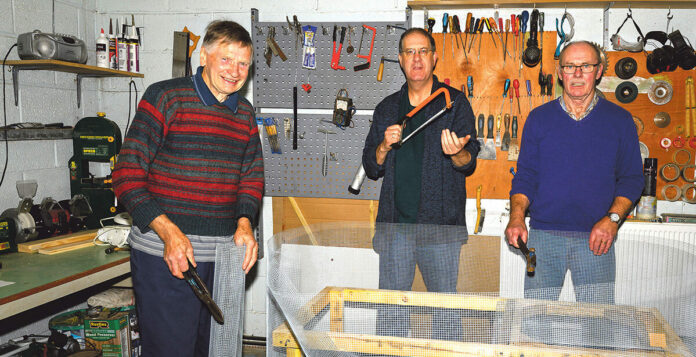In our most recent Make A Difference article here Bridget Ginnity explored how we can control our consumerism and waste generation. Here she profiles a group and an individual tackling waste in different ways
Christy Collins, Shannon Men’s Shed
We pick up old stuff from the recycling centre and do them up, bikes, old timber and so on. We use wood we get to build outdoor furniture of the primary schools, buddy benches, picnic benches, bug hotels and so on – maybe we need buddy benches in parks for adults too.
We upcycled old steel seats from Shannon park for the new wetlands area, and they’re like new.
We are lucky to have a premises in the industrial estate, with three workspaces and a meeting room.
The meeting room is the best part of it, it’s great to see men talking, an alternative to the pub
We make all kinds of thing. We have a woodturning lathe that is great for making bowls and lamps, from old timber. At the moment we’re making pens for Bev Truss and her hedgehogs.
People get a great kick out of repairing or upcycling something. We’ve about 50 members, some are beginners but a lot of the lads are very handy.
The more experienced lads show how to use the equipment and give tips to the others. We’ve also had classes in mosaic, art and stained glass.
Féidhlim Harty, Ennis, Author of Towards Zero Waste

Many people find it tricky to know how to move towards a zero waste society. Here are some tips:
1 Keep plastic out of your shopping basket. Your plastic waste will drop dramatically if you buy loose fruit and veg and unprocessed foods.
2 Practice the new three Rs: return, repair, reuse. Use returnable containers, repair where possible, reuse things yourself or find other homes for them. To donate or avoid buying new, uses places like charity shops, buy&sell, Clare Free to a Good Home.
3 Make good rich soil for your garden from your kitchen and garden organic waste. Anything that was recently alive can be composted.
4 Recycle as a last resort. While recycling is essential, it’s the last one to employ. The industry can be quite polluting and energy intensive and should only be used for those things that we haven’t managed to cut out
5 Give feedback to shops and suppliers and put pressure on the government to change policies to help create a zero waste culture. Only by demanding a better world together will we achieve it.

